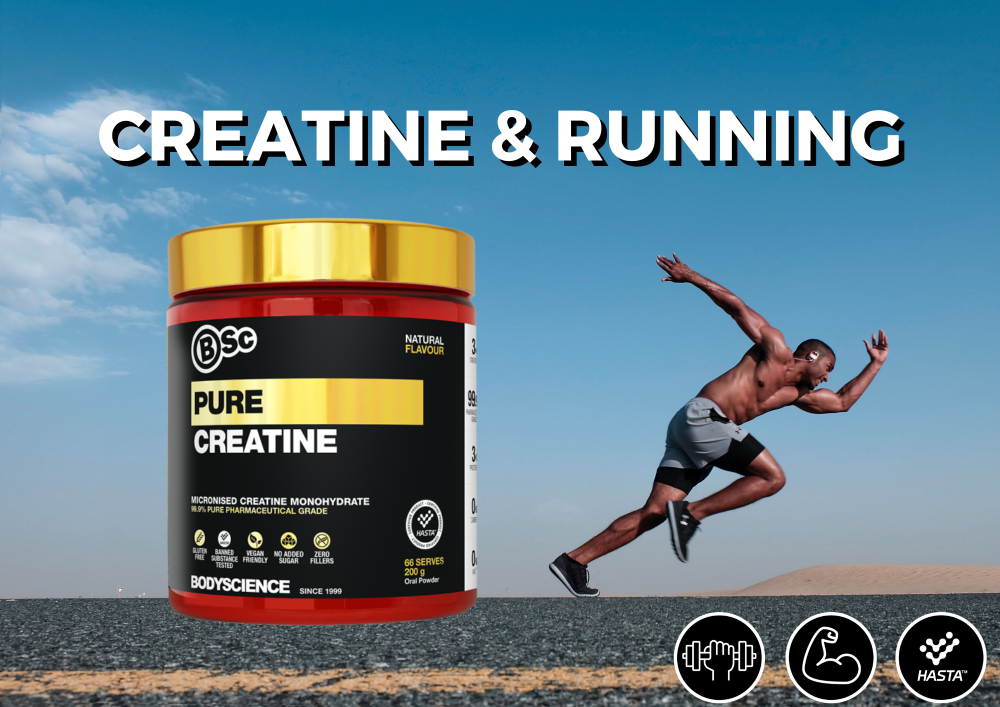Your Guide on Creatine and Running
Your Guide on Creatine and Running
Creatine is one of the most popular supplements on the market. Athletes, gym-goers, trainers, and fitness experts rave about the benefits of incorporating creatine into your supplement regime. Creatine is most commonly associated with gym and weight training, but what’s the relationship between creatine and running? Could this supplement improve your running performance? This is your complete guide to creatine and running. Let’s get straight into it.
What is Creatine?
Firstly, we’ll share a quick refresher on what creatine actually is. Creatine is made up of three amino acids. It provides our muscles with the energy we need to move and exercise. Half of the creatine supply in the body comes from our diet from foods such as fish and red meat. The remaining half is created naturally in our bodies by the liver and kidneys. When we take creatine supplements, we increase the creatine stores in our body — known as creatine phosphate — and these stores give us an energy boost. Let’s break down how this works. Our bodies churn through adenosine triphosphate (ATP) for energy when we work out. ATP provides us with the energy we need to complete high-intensity work, such as short-distance, all-out runs. Our creatine phosphate stores can be used by the body to produce more ATP after it has depleted, which allows us to exercise harder for longer and complete more reps and sets. Given we can push harder during our workouts, this helps us build muscle. Creatine also reduces the risk of injuries, strains, and soreness after a tough workout. When it comes to creatine dosing, there are two phases. If you’re new to taking creatine, you’ll need to start with a loading dose to top up your body’s stores. The recommended loading dose is 20g per day for 2 to 5 days, or you can take a smaller dose for a longer period of time. For example, you might opt for a 3g daily dose for 28 days. Once you’ve completed your loading phase, you will transition to a maintenance dose. A safe and healthy maintenance creatine dose is 2 to 5g daily. Research shows that the primary benefits of creatine include Boosting high-intensity exercise performance Increasing muscle strength and power Increasing muscle mass Decreasing muscle soreness post-workout Aiding muscle recovery Reducing muscle cramping Reducing fatigue Speeding up recovery Increasing training tolerance Improving brain function

Can Creatine Help With Running?
Running requires a lot of energy, so creatine can definitely help with running. As we know, creatine helps our body to produce more ATP, which then gives us an extra energy boost to exercise harder and for longer. This can be beneficial not only to a strength training program but to running, too. Creatine is mainly helpful for enhancing performance in high-intensity exercises such as sprinting, lifting, and jumping. Evidence also suggests that creatine can also increase aerobic capacity by delivering more ATP from the cells to the muscles, which ensures continued energy supply and reduced fatigue. This boosted energy supply and delayed fatigue is very beneficial to runners, particularly sprinters completing interval training or hill sprints. If you consume foods high in creatine, you may be sourcing enough creatine from your diet. Even so, a creatine supplement will help to maintain your stores and maximise your performance. However, vegan and vegetarian runners could benefit even more from creatine supplementation. Research has found that creatine supplementation increased total creatine and phosphocreatine levels in the red blood cells and muscles in vegetarian participants to a higher degree than that of people who ate meat. The same study also concluded that creatine increased lean tissue mass, muscular strength, muscular endurance, and power output on the Wingate test. The results were more significant in vegetarians than in omnivores. Omnivores still improved in each of these areas, but the vegetarians increased more significantly.

Does Creatine Help Endurance Running?
While creatine is of benefit to high-intensity exercises such as sprinting, it has limited benefits for endurance running. This is because the effects of creatine diminish as the length of time spent exercising increases. Additionally, endurance exercises are low in intensity and rely less on rapid ATP synthesis, which makes creatine less significant. So, most distance and endurance runners won’t need to take creatine regularly, as it has proven to be most effective for rapid, max-effect workouts like short-distance, speed-focused running. However, one benefit of creatine is its ability to improve training sessions, which can improve your endurance performance in the long run (pun intended). Most endurance runners complete a varied training program, and this is where creatine comes in. One study found that creatine increased the number of intervals and the amount of training endurance athletes could complete. So, if your training regime incorporates sprints, HIIT workouts, or strength work, you’ll benefit from taking creatine. Your training capabilities will improve, which in turn can improve your endurance performance.
Which Creatine Supplements are Best for Running?
When it comes to finding the right creatine supplement, we say the purer, the better. The International Society of Sports Nutrition states that creatin monohydrate is the most beneficial creatine supplement for improving high-intensity performance, and its absorption is enhanced when consumed with carbs or carbs and protein. While some pre-workout formulas contain creatine, there’s usually not enough in these formulas to maximise creatine’s impact. Pre-workout blends often contain 1 to 2g of creatine per serving, which is below the optimal daily dose. Our Body Science K-OS Pre-Workout Blend contains 3g of creatine, which is enough for your daily dose. However, if you react to caffeine, you’re better off opting for pure creatine. The Body Science Pure Creatine is Hasta-Certified and contains 99.9% pharmaceutical-grade creatine monohydrate. Creatine can also be mixed with whey protein, BCAAs or glutamine to achieve specific results, such as muscle building and lean muscle mass retention. Should I Take Creatine Before Running? The jury is still out on whether there’s an optimal time to take creatine. In fact, there are well-rounded arguments for taking it before, after, and before and after a workout. Let’s take a look at the benefits of each. Before Running We know creatine provides our muscles with the energy they need for a high-intensity workout. Taking creatine before you workout will ensure you make the most of this energy boost. Creatine stays in the body for around one to one and a half hours but can take up to an hour to be absorbed into your body. So, if you’re taking it pre-workout be sure to take it at least 30 minutes before your session. After Running On the other hand, many experts swear by a post-workout creatine hit. After you’ve finished exercising, your creatine stores have depleted, and your muscles have become fatigued. Taking your creatine supplement after your session can help to replenish those stores before your next workout, and help to recover your tired muscles. It’s also been suggested that your body better absorbs creatine post-workout. If you want to take creatine after your workout, be sure to take it straight away so it can get to work. Before and After Running To throw a spanner in the works, some research suggests that splitting your daily creatine dose before and after your workout may be the best approach. This essentially gives you the best of both worlds. You maximise your energy boost pre-workout and maximise replenishment and recovery post-workout.

Creatine and Running: The Bottom Line
Creatine supplements essentially give our bodies an extra energy boost that helps us work out more intensely and for longer. It also helps to recover our muscles and replenish our creatine stores post-workout in preparation for our next workout. Creatine can be taken to maximise running performance. The added energy boost is particularly useful for high-intensity exercises, such as short-distance sprints. Creatine supplementation is less effective for endurance running, as the effects of creatine diminish over time and endurance exercises rely less on quick ATP synthesis. However, most endurance runners will incorporate high-intensity workouts in their training sessions. Creatine can improve this performance, which in turn can improve your endurance running capabilities. Our Body Science K-OS Pre-Workout Blend contains 3g of creatine, which meets the daily dosage requirements. If you’re looking for a pure creatine blend, opt for our 99.9% pharmaceutical-grade Body Science Pure Creatine instead. Want to know more about what creatine can do for you? You can get in touch with one of our expert PTs for personalised advice.
















